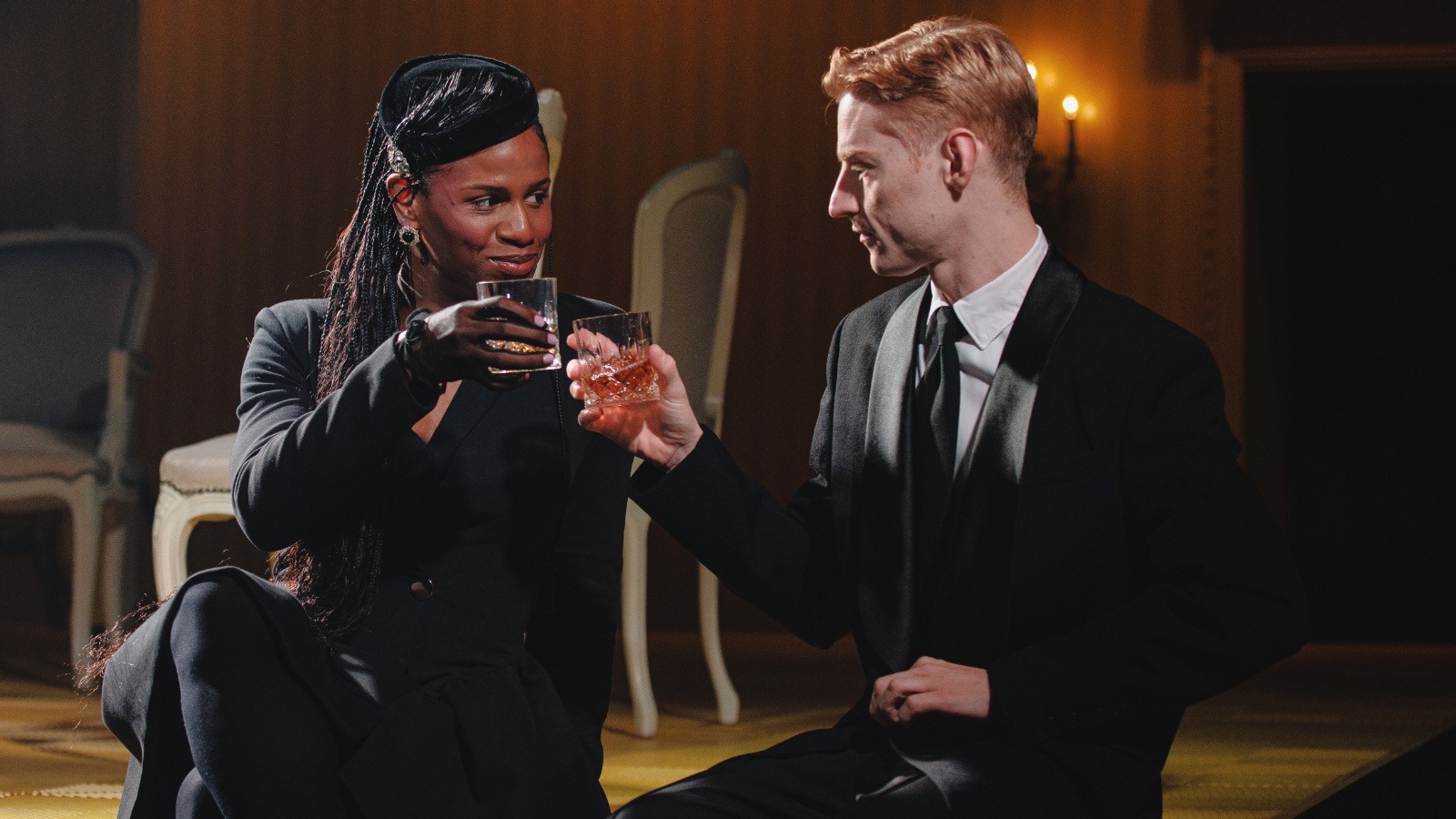Power, Privilege, and Royal Parlor Games In PRINCE FAGGOT — Review
Right off the bat, Prince Faggot breaks the tension.
Playwright Jordan Tannahill eases us into his fitfully intriguing, mostly frustrating new work by opening with a talking circle. Before the story begins for real, our six performers gather upstage as “themselves” (or some theatrical variant thereof) to unpack the provocative premise that has brought us here to Playwrights Horizons (who co-produce this world premiere with Soho Rep).
“Leave that real child out of all this shit,” protests Performer 2 (the invaluable K. Todd Freeman), motioning to a photo of Prince George of Wales projected behind them. Yes, that is George as in eldest son of William, and second in line of succession to the British throne; and yes, it is that particular photo, taken when George was four (you might know the one). Freeman/Performer #1 goes on to warn: “You start talking about queer childhood, they’re gonna brand you a groomer.”
But our chief storyteller, Performer 1 (Mihir Kumar), is undeterred. He coaxes his fellow performers to reflect openly on their own queer childhoods, and on all the thorny questions this photo raises: queer identification, ingrained societal stifling of effeminate traits, and the still prevalent “heterosexual default.”
It’s a stimulating, intellectually rich prelude, one that affirms Tannahill’s intent to engage carefully with the questions raised by his (perhaps a little shitpost-y) title. So the biggest surprise of Prince Faggot is how formulaic the play quickly becomes. Once we shift into an imagining of an adult, openly gay Prince George (John McCrea) publicly debuting his first boyfriend, Faggot retreats into an oddly rote narrative of power, privilege, and royal parlor games.
George’s new beau is Dev Chatterjee (Kumar again), a smart, savvy fellow Oxbridge student of South Asian descent. Naturally, the couple’s hard-launch prompts vicious waves of harassment and bigotry—no matter that Dev’s upper-class lilt is posher even than George’s. At least William and Kate (Freeman and a tremendous Rachel Crowl) are outwardly supportive, if pragmatically cautious. And while an unseen King Charles might be more old-fashioned, he is not an active problem.

Tannahill’s ensuing drama too-closely echoes Prince Harry’s rebellious journey in Mike Bartlett’s King Charles III, or even feels–in its weaker moment—like a high falutin spin on Red, White & Royal Blue. In fairness, those two examples do not feature a prince tied up and gagged in a sex dungeon, or obligingly telling his (top) boyfriend, “I like your big dick in my pussy, sir.” Yet as George and Dev’s relationship buckles under the pressure of public scrutiny, the beats still feel mostly familiar. More fatally, McCrea and Kumar never find a lived-in chemistry, even (or especially) when their naked bodies are entwined. The sex is refreshingly explicit, but also feels cold, distant. And Kumar is especially flat, often sucking the life out of the pair’s scenes with toneless line deliveries.
It doesn’t help that Tannahill’s dialogue is self-consciously academic, casting George and Dev more as representations of oppositional worldviews than fleshed-out human beings. One senses the influence of Angels in America in the pair's intellectual sparring matches—and certainly, as in Kushner’s masterwork, the ideas are potent. But neither love nor longing is palpable underneath the words, and George and Dev ultimately feel like ciphers.
William and Kate are also thinly drawn, coming across as an average middle-aged couple just doing their best for a high-maintenance gay kid (save for one passing allusion to William’s quiet affairs). And George is implausibly naive about the realities of debuting Dev, as in his surprise at the presence of a communications director, Jacqueline Davies, upon Deb’s first visit to Anmer Hall. (A delightful David Greenspan is pure perfection as Davies, and in multiple other roles.)
Strict accuracy wouldn’t be important if Faggot were a more hyper-real or absurdist work, less concerned with the current royal family than queer life across a broader canvas of imperialist rule. That’s in there too, for sure. But so long as Tannahill is spending a decent amount of real estate on a familiar Westminster, the false details stick out—whether the royal press shop’s hands-off approach to Dev’s public image, or Dev’s own horror when a news truck shows up outside his parents’ home.
Faggot is more successful when it sets the real royal family aside. In monologues interspersed through the action, the entirely queer cast take turns speaking as themselves (or again, some version thereof), stepping out of the action to reflect on resistance, liberation and faggotry. Though their thematic tie-ins to the main action are sometimes strained, these soliloquies are involving and deeply moving, most especially N’yomi Allure Stewart’s poignant closing words. Director Shayok Misha Chowdhury feels most at home in these scenes—while he keeps the main action moving smoothly, his staging and David Zinn’s sets feel uninspired.
By the play’s end, George’s schematic journey finally leads him to an essential choice between palatable queerness and pure faggotry. It’s a salient question. But for a play called Prince Faggot, it feels more like a starting point than a place to leave us.
Prince Faggot is now in performance at Playwrights Horizon in New York City.














